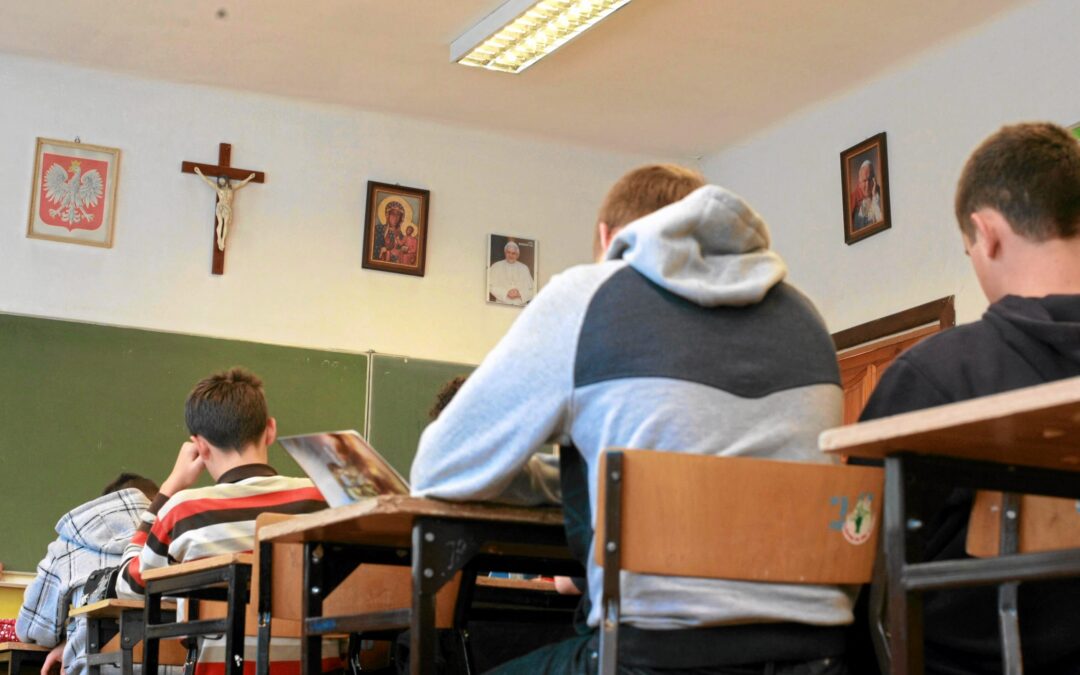Organisations representing Poland’s Christian denominations have petitioned the Supreme Court to submit a motion to the Constitutional Tribunal (TK) asking it to verify the legality and constitutionality of the government’s changes to religion classes.
The changes in question allow schools and preschools to organise religion classes – which in Poland usually involve the teaching of Catholic catechism – in groups composed from different year groups if fewer than seven children express a willingness to attend.
Up until now, in such cases, a separate class is held for each cohort.
The organisations argued that the changes should have been discussed and agreed upon with the church and that they put many religion teachers at risk of losing their jobs. They also claimed that it limits access to religious education and “violates the constitutional right of parents to raise children in accordance with their beliefs”.
Polska Rada Ekumeniczna i @EpiskopatNews złożyły do I prezes Sądu Najwyższego petycje ws. rozporządzenia @MEN_GOVPL dot. organizacji nauki religii w szkołach i przedszkolach, w tym prowadzenia jej w łączonych grupach międzyoddziałowych i międzyklasowych.⤵️https://t.co/WQkM4hFCFX
— Polska Rada Ekumeniczna (@PREkumenia) August 22, 2024
“This regulation, in our view, contains a number of legal deficiencies,” Leszek Gęsiak, spokesman for the Polish Episcopal Conference (KEP), the central organ of the Roman Catholic church in Poland, said at a press conference held yesterday.
After consulting specialists in canon law and civil law, “both the Catholic church and the Polish Ecumenical Council decided to prepare [petitions] which [were] submitted to the registry of the First President of the Supreme Court”, he added.
In their petitions, the KEP and the Polish Ecumenical Council (PRE) – an organisation representing Poland’s minority Christian denominations – request that the Supreme Court refer the case to the TK to to verify the legality and constitutionality of the government’s changes.
They argue that, according to article 12 of the 1991 Act on the Educational System, the education minister specifies the conditions for organising religion classes in agreement with the authorities of churches and religious associations in Poland.
Sorry to interrupt your reading. The article continues below.

Notes from Poland is run by a small editorial team and published by an independent, non-profit foundation that is funded through donations from our readers. We cannot do what we do without your support.
They claim that, despite two meetings being held between them and the ministry at their request, “this procedure has not been followed, even though the practice…has been followed by all education ministers for the past 30 years”.
“Minister Nowacka’s regulation is flawed on procedural grounds, is illegal and is therefore unconstitutional,” Paweł Borecki from the Department of Religious Law at the University of Warsaw told the Polish Press Agency (PAP).
He argued that the regulation breaks the 1991 act, the prime minister’s decree of 2002 on the principles of legislative technique, and the fundamental constitutional principle of legalism.
However, education minister Barbara Nowacka claimed that proper consultations were held at the ministry and that “some of the comments made during the meetings were taken into account by us because they had a rational basis”.
“I remind the bishops that the eighth commandment states: ‘Do not bear false witness’,” Nowacka told broadcaster TVN24.
With hundreds of thousands of followers on social media, Poland's Catholic influencers are connecting to younger audiences by blending modern technology with ancient scripture, writes @CE_Zielinski https://t.co/5geDx1Z7o9
— Notes from Poland 🇵🇱 (@notesfrompoland) August 2, 2024
Meanwhile, the KEP and the PRE also argued that the new regulation – signed by Nowacka on 26 July – puts many religion teachers at risk of losing their jobs and not being able to gain new teaching qualifications prior to 1 September, when the new school year starts.
Lastly, they pointed out that the changes “may also lead to a restriction of access to religious education and violate the constitutional right of parents to raise their children according to their beliefs”.
On 21 August, priests organised a protest against the changes at Warsaw’s Castle Square.
“This is no longer just promoting religious intolerance, but is an attempt by the education ministry to legalise discrimination on the basis of religious affiliation,” said Piotr Janowicz, chairman of the Association of Lay Catechists (SKŚ), quoted by the religious website Opoka.news.
“In 1990, religion returned to schools after the fall of communism in Poland…We did not expect that after 34 years in free Poland, we would have to ask for it again,” added Dariusz Kwiecień, spokesman for the SKŚ, which also appealed to President Andrzej Duda to challenge the regulation at the TK.
W Warszawie na Placu Zamkowym trwa protest w „obronie lekcji religii w szkołach” organizowany przez Stowarzyszenie Katechetów Świeckich | @wirtualnapolska pic.twitter.com/K4EDjzjNfZ
— Jakub Bujnik (@JakubBujnik) August 21, 2024
Poland’s Christian organisations have in recent months criticised a number of the new government’s changes to the education system that affect religion classes and the teaching of Catholic catechism.
In February, the KEP opposed the government’s plans to reduce the number of hours of religion classes, calling the idea an infringement of human rights.
In April, the organisation criticised the government’s decision to remove school catechism lessons from the grade average received by students at the end of the academic year.
Wrocław, Poland's third-largest city, has called for an end to municipal funding for Catholic catechism classes in schools.
It says it spends millions of zloty a year on the lessons even though only a minority of pupils now attend them https://t.co/q11Cqxu2BN
— Notes from Poland 🇵🇱 (@notesfrompoland) October 21, 2023
Main image credit: Rafał Michałowski/ Agencja Wyborcza.pl

Agata Pyka is a former assistant editor at Notes from Poland. She specialises in Central and Eastern European affairs, cybersecurity, and investigative reporting. She holds a master’s degree in political communication from the University of Amsterdam, and her work has appeared in Euractiv, the Balkan Investigative Reporting Network (BIRN), and The European Correspondent, among others.



















